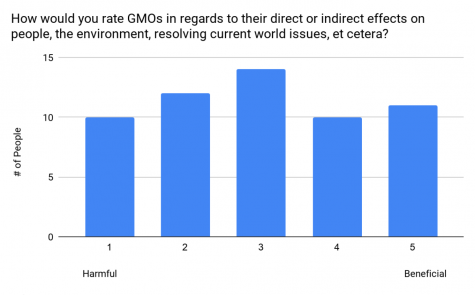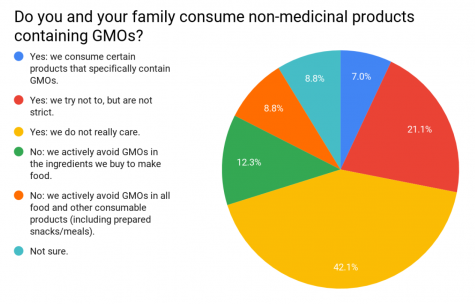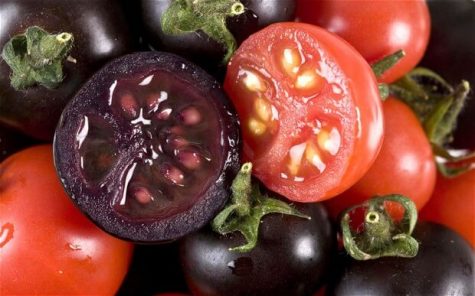Jekyll and Hyde: The Genetically Modified Foods Controversy
February 3, 2020
While some say that genetically modified foods (GM foods) hold the potential to solve many of the world’s crises, others consider GM foods unsafe and dangerous to not only people but the planet as well.  In BCA, the most popular opinion on the impacts of genetically modified organisms (GMOs) is neutral, but the majority of those students surveyed expressed a stance for or against GMOs. When asked whether they consume GM foods, most of the surveyed students replied that they do. However, 42.2% have some reservations about GM foods and try to avoid them to a certain degree.
In BCA, the most popular opinion on the impacts of genetically modified organisms (GMOs) is neutral, but the majority of those students surveyed expressed a stance for or against GMOs. When asked whether they consume GM foods, most of the surveyed students replied that they do. However, 42.2% have some reservations about GM foods and try to avoid them to a certain degree.

Why are GM foods so controversial, even though the scientific consensus is that they pose no greater risk than unmodified foods? Firstly, it should be understood that the impacts of GM foods extend beyond humans and other animals that consume them. The environments in which they grow, such as the soil, water supplies, and ecosystems, also face the consequences that arise from planting GM crops. However, the controversy becomes complex, especially in situations where planting more GM crops can have both positive and negative results. GM crops have significantly higher yields and greater nutritional value, which is beneficial as it offers relief to people suffering from hunger and malnutrition, especially in poorer locations. On the other hand, their commercialisation can also lead to over-farming and further conflicts depending on resource availabilities in specific regions and whether areas become heavily dependent on those who control this industry.
Similarly, in reducing the heavy usage of agricultural pesticides and herbicides, GM crops can either aggravate or alleviate the situation. Some GM crops, called Bt crops, are engineered to produce proteins that are deadly to insects, but harmless to humans. If implemented, Bt crops can potentially eliminate the need for pesticides. In contrast, GM crops engineered to resist the toxin from herbicides allow farmers to use even more herbicides without harming their crops. Even though glyphosate–the herbicide to which GM crops are most commonly resistant–is much less harmful to the body than herbicides that have been used in the past, using herbicides in general still cuts out the lower levels of the local food chain, resulting in decreased local biodiversity.
For most people, though, the more direct concern about GM foods is safety. ACAHA sophomore Vincent Chang says that “…other than when we [his family] choose to eat at a restaurant, there has never been a moment in my life when we didn’t have organic produce for dinner or something of the sort.” Vincent believes that his family “was always health-conscious, and they always cared about natural produce and food.” He adds, “With my mom’s close relationship with organic and all-natural foods, I’ve always seen GMO foods and produce [as] harmful to my body. Although, in my culinary class we did discuss GMO foods, and I found out that there is no real evidence that GMO foods are harmful.” However, Vincent says that nothing can replace his fond memories of gardening and growing food at home.
In reference to the selective breeding of crops that has occurred since agriculture first came into place, Dr Pergolizzi, BCA’s genetics research mentor says, “Whether you do [modifications] in a laboratory, or you do it in a field, it’s really the same thing.”

In regards to the benefits of GM foods, he gives the example of GM high-lysine corn, which counters the lysine deficiency caused by a corn-based diet, which is naturally low in this essential amino acid: “Especially in places like Central and South America, where people’s diets are heavily corn-based, it [high-lysine corn] has prevented a lot of malnutrition syndromes from occurring. Our well-fed American population, marching around with signs saying that’s a bad thing, that it was modified in a laboratory so you shouldn’t be able to eat it; tell that to your starving kids!”
However, Dr Pergolizzi still holds reservations about modified organisms. He says that any sort of modified organisms, whether lab-created or not, should be contained “…for a long enough time that we’re absolutely sure that it’s nutritious, that it doesn’t have any untoward effects on the environment, that it’s not pushing any species to extinction, that it’s not going to create any cross-species hybrids that aren’t something we want to have.” He emphasises that “just like drugs”, GM crops must undergo rigorous inspections by the Food and Drugs Association, as well as long-term studies to ensure their safety.
Moreover, he adds, “Money is the driver; these agricultural companies, they want to get what they have created out there as soon as possible…They are driven more by money than by safety, and I think that it’s a legislative requirement that we force these companies to be safety conscious.” Echoing his previous remarks, he finishes, “If people are going put up signs and march and scream about something, I think it should be [about] separating these big companies from the influence that they have over our politicians and over the laws that are made.”
From personal health to policies, from first-world countries to developing nations, GM foods and the controversy surrounding them are involved in all levels of society. While this debate, as well as countless others, are far from settled, it is crucial to continuously research, learn, and evaluate to make informed decisions for any and all subjects.





